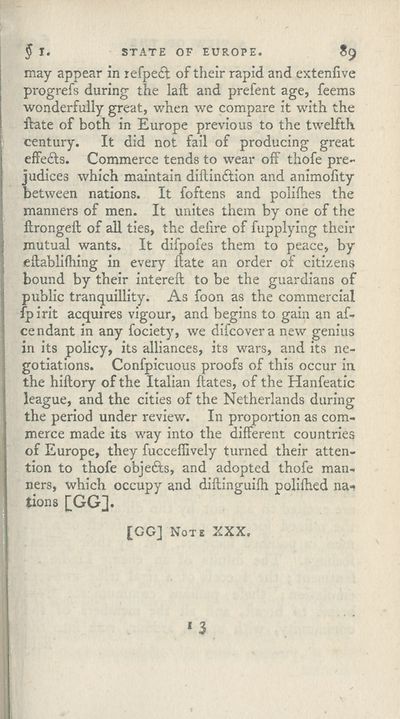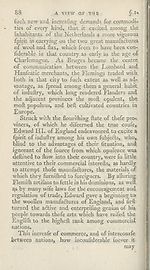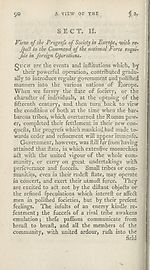Download files
Complete book:
Individual page:
Thumbnail gallery: Grid view | List view

§ t. STATE OF EUROPE. 89
may appear in refpedl of their rapid and extenfive
progrefs during the laft and prefent age, feems
wonderfully great, when we compare it with the
ftate of both in Europe previous to the twelfth
century. It did not fail of producing great
effects. Commerce tends to wear off thofe pre¬
judices which maintain diftin&ion and animofity
between nations. It foftens and poliffies the
manners of men. It unites them by one of the
ftrongeft of all ties, the delire of fupplying their
mutual wants. It difpofes them to peace, by
eftablifhing in every ftate an order of citizens
bound by their interell to be the guardians of
public tranquillity. As foon as the commercial
fp irit acquires vigour, and begins to gain an af-
cendant in any fociety, we difcovera new genius
in its policy, its alliances, its wars, and its ne¬
gotiations. Confpicuous proofs of this occur iu
the hiftory of the Italian ftates, of the Hanfeatic
league, and the cities of the Netherlands during
the period under review. In proportion as com¬
merce made its way into the different countries
of Europe, they fucceffively turned their atten¬
tion to thofe objedts, and adopted thofe man¬
ners, which occupy and diftinguilh polifhed na-*
tions [GG].
[GG] Note XXX.
may appear in refpedl of their rapid and extenfive
progrefs during the laft and prefent age, feems
wonderfully great, when we compare it with the
ftate of both in Europe previous to the twelfth
century. It did not fail of producing great
effects. Commerce tends to wear off thofe pre¬
judices which maintain diftin&ion and animofity
between nations. It foftens and poliffies the
manners of men. It unites them by one of the
ftrongeft of all ties, the delire of fupplying their
mutual wants. It difpofes them to peace, by
eftablifhing in every ftate an order of citizens
bound by their interell to be the guardians of
public tranquillity. As foon as the commercial
fp irit acquires vigour, and begins to gain an af-
cendant in any fociety, we difcovera new genius
in its policy, its alliances, its wars, and its ne¬
gotiations. Confpicuous proofs of this occur iu
the hiftory of the Italian ftates, of the Hanfeatic
league, and the cities of the Netherlands during
the period under review. In proportion as com¬
merce made its way into the different countries
of Europe, they fucceffively turned their atten¬
tion to thofe objedts, and adopted thofe man¬
ners, which occupy and diftinguilh polifhed na-*
tions [GG].
[GG] Note XXX.
Set display mode to:
![]() Universal Viewer |
Universal Viewer | ![]() Mirador |
Large image | Transcription
Mirador |
Large image | Transcription
| Antiquarian books of Scotland > Kings & rulers > History of the reign of the Emperor Charles V. > Volume 1 > (107) |
|---|
| Permanent URL | https://digital.nls.uk/109183615 |
|---|
| Description | By William Robertson. London : Cadell and Davies, 1798. |
|---|---|
| Shelfmark | ABS.1.76.13 |
| Additional NLS resources: | |
| Description | Thousands of printed books from the Antiquarian Books of Scotland collection which dates from 1641 to the 1980s. The collection consists of 14,800 books which were published in Scotland or have a Scottish connection, e.g. through the author, printer or owner. Subjects covered include sport, education, diseases, adventure, occupations, Jacobites, politics and religion. Among the 29 languages represented are English, Gaelic, Italian, French, Russian and Swedish. |
|---|

